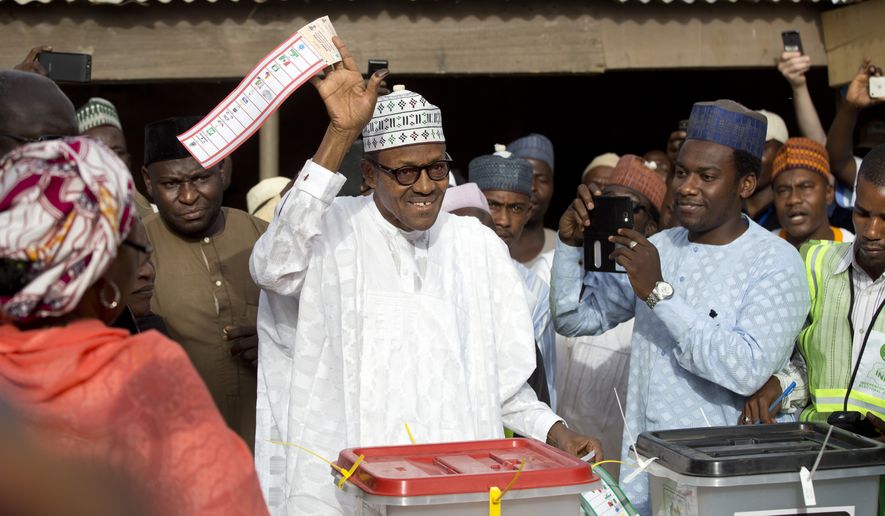Muhammadu Buhari briefly ruled Nigeria in the mid-1980s after a military coup. The former general will get a second chance as president through the ballot box.
In a political milestone for Africa’s most populous country, the 72-year-old Mr. Buhari and his opposition All Peoples Congress swept to victory, ousting incumbent President Goodluck Jonathan Tuesday in what will be Nigeria’s first peaceful transition of power from one party to another in its modern history.
In a country almost evenly divided between Christians and Muslims, the race had been projected to be closer than the final tally indicated. Mr. Jonathan, seeking a second full four-year term in office, called Mr. Buhari to concede and to congratulate him, officials of the ACP told the Reuters news agency.
Afterward Mr. Buhari asked his jubilant supporters that they engage in “calm, sober celebrations” and avoid violence. An estimated 800 people were killed in post-election violence when Mr. Jonathan, a Christian from the south, defeated Mr. Buhari, a Muslim with a political base in the heavily Islamic north, in 2011. This was Mr. Buhari’s fourth run for the presidency, and the result marks an end of more than 15 years of political dominance by Mr. Jonathan’s PDP.
“It’s not the result that we wanted but it’s a good day for Nigeria if we show the world we can run a credible election,” a minister in Mr. Jonathan’s government told the Reuters news agency.
A preliminary final tally of the results compiled by Reuters gave Mr. Buhari 15.4 million votes against 13.3 million for the incumbent, making a legal challenge to the results unlikely.
SEE ALSO: Nigeria seeks better intel on Boko Haram from West
A U.S. State Department official speaking on background tentatively declared America’s openness to work with Mr. Buhari, despite voting irregularities in Sunday’s vote cited by both U.S. and British election observers.
“I would reiterate that the U.S. is ready to work with whichever candidate the Nigerian people elect through the democratic process,” the official said.
“Buhari has peacefully contested the last few presidential elections and accepted the results of those votes, even when he questioned the credibility of the process,” the U.S. official said.
Political control in Nigeria has traditionally swung between the Christian south and the Muslim north, and some Muslim voters said Mr. Jonathan’s bid for a second term violated the country’s political protocol. The relatively peaceful transfer of power represented in Sunday’s national vote marks a milestone for the country.
“This is the first time in Nigeria that a sitting government will be voted out of power using purely democratic means,” APC spokesman Lai Mohammed told reporters in Abuja. “The people of Nigeria have taken over.”
Mr. Buhari is the former military leader of Nigeria who held power briefly in the mid-1980s after a military coup. He unsuccessfully ran for president in 2003, 2007 and in 2011, and his win here could come with some outsized expectations of change from his supporters.
SEE ALSO: Boko Haram pledges allegiance to Islamic State
“There’s now going to be immense expectation placed on Buhari,” said Richard Downie, deputy director and fellow of the Africa program at the Center for Strategic and International Studies. “He has a reputation as a very straight shooter, someone who’s very tough on corruption.”
Mr. Downie said Mr. Buhari faces major challenges managing the country’s political divide, boosting the economy in the face of falling global oil prices, and dealing with the brutal jihadi Boko Haram, which is still very active in the north.
“He’s going to have to be more collaborative and more inclusive than previously, and probably have to get his hands dirty in the Nigerian political system,” Mr. Downie added.
Mr. Buhari’s main concern will be restoring trust in government in Abuja after widespread disillusion with the Jonathan government, which faced charges of corruption and failing to provide security. Nigeria ranks 136th out of 174 nations on Transparency International’s index of perceived corruption, a reputation which Mr. Buhari will have to work hard to get rid of.
Despite concerns expressed Monday by British and U.S. election observers and despite violence by brutal Islamist movement Boko Haram at some polling sites, Nigerian officials say Sunday’s vote went relatively smoothly.
The elections ran successfully despite being delayed in February by the Independent National Electoral Commission citing security concerns caused by Boko Haram.
Many outside observers said the delay could help Mr. Jonathan and the PDP, but Mr. Buhari was the clear winner nonetheless.
On Saturday the Islamic insurgent group launched deadly attacks on voters in the battle stricken northeast region of the country. The attacks left 41 people dead, including a legislator, but despite the violence U.N. officials said the elections were largely unaffected.
⦁ This article is based in part on wire service reports.
• Jonathan Soch can be reached at jsoch@washingtontimes.com.




Please read our comment policy before commenting.